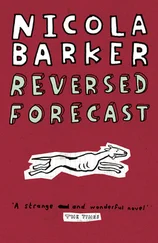On ‘panicked’, Aphra suddenly says, ‘You have to take it off.’
‘Pardon?’
She slides the leg down from my shoulder, over the side of the chair and on to the floor.
‘Oh God ,’ she says, scrabbling at the pigskin. ‘You must get it off . It’s frightening me.’
I stand up, confused. ‘Don’t be silly. It’s just a boot.’
‘I don’t care . I don’t like it. It’s scaring me. I can’t breathe.’
She puts her hands to her neck, gasping.
I fall on to my knees and start unbuttoning.
She’s actually crying now, hiccuping. ‘I just don’t… hick …like it… hick …I can’t stand the… hick …feeling…’
As I struggle to unbutton, she’s pulling at the pigskin, frantically, which isn’t helping.
‘I must bend my knee,’ she says, and starts desperately trying to stand up.
‘Sit down ,’ I say (loudly).
‘ Shhh !’
She puts her hands over my mouth, looking over towards the door, anxiously, then clasps her own throat, wheezing, horribly. She seems to be having some kind of panic attack.
‘Just calm down,’ I say, ‘and we’ll get it off.’
But she simply stares at me, wheezing, her cheeks draining, her eyes glazing.
So I slap her. She gasps, her eyes fly wide, she yells, ‘You fucker !’ then she slaps me back.
(Ah. Just what I needed to sort out my sinuses.)
It’s at this point I hear some kind of call from a bedroom. A quiet voice. A man’s voice. Aphra gives no sign of having heard anything. She collapses back on the sofa, covering her face with her hands, sobbing.
I grit my teeth, and continue unbuttoning. She stops crying fairly rapidly and then just sits there, breathing heavily, holding her cheek, watching me, ruefully.
It takes five minutes to get the bastard off. I finally pull it free and throw it back into the box. My thumb and index fingers are almost raw. I inspect them, scowling.
‘Sorry,’ she says, peering up at me through her fringe, ‘I just really hate to feel constrained.’ We’re both silent for a minute, then, ‘Sometimes I feel like a ghost,’ she says, and holds out her two arms (like a pretty ghoul) and inspects them.
‘Ghost arms,’ I murmur softly.
(They’re certainly pale enough.)
She nods. She half-smiles. Then she grabs a hold of my hand (Good God that’s some grip) and pulls me down on top of her.
Two minutes pass in a chaos of zips and elbows, then suddenly she freezes. ‘Are you crying ?’
( Crying ? Me?)
‘Nope.’
(Gasping a little, maybe.)
She pushes me aside, sits bolt upright, puts her hand to her neck and says, ‘But you are …’ Then before I can respond she jumps up. ‘ Fuck …it’s snot !’ she exclaims. ‘On my lovely neck .’
(‘Lovely neck?’ Get her !)
Oh dear. Oh dear . My nose has been dripping.
‘I’ve got flu ,’ I stutter. ‘What did you expect?’
‘Perhaps you should go,’ she says, clutching at her temples.
‘The thing about snot,’ I try and reassure her, ‘is that it’s basically just saliva with extra flavour . Like a kiss with added salt .’
‘Fuck off,’ she says, then disappears.
I hear her clattering around in the bathroom, then opening a couple of drawers in the bedroom. I hear some furtive muttering. Then nothing.
Ten minutes pass.
I inspect her tape cassettes. I look at her shoes, her books. I finish my tea (cold). I try to get the TV to work.
Twenty minutes pass.
Thirty.
Is she ill? Asleep? Pondering the snot/kiss dichotomy? Waiting? Distressed?
Does she want me to go?
Really ?
Really ?
I give her an hour to change her mind.
Okay . Ninety minutes, tops.
And my flu — thanks for asking — has grown considerably worse in the meantime.
Track six? Are you kidding ?! Primal Scream. ‘Higher than the Sun.’
Every time.
God please forgive me, but I speed-read the Primo Levi as I compile the cassette (I can’t commit. I won’t commit. This is too Big. I just can’t own it). But every so often (just the same) the strong rope of its narrative lassoes me up, pulls me in and drags me along (spreadeagled, scrabbling for a handhold, bleating out my weak defence of terminal frivolity. I’m totally superficial, see ? I’m inherently trivial. D’you have any fucking idea how hard that can sometimes be?).
They’re full of ghosts, these two books, both living and dead. In the Author’s Preface (and even this isn’t a safe place) Levi says how for most people (and most peoples) ‘every stranger is an enemy’, but that this belief, this feeling, does not exist (in general) as the basis of any formal doctrine, but rather ‘it betrays itself only in random, disconnected acts’.
In Paul Bailey’s Introduction he snipes at ‘the artists who use the terrible fact of the camps for emotional and aesthetic effect’.
So is Blaine doing that? Can we accuse him of this crime? Even if it was just a question of mentioning the Levi book in passing (like it was vaguely connected, in some way, to the ordeal he was undertaking)?
I ponder this for a while.
But the reference was an oblique one.
Is Bailey right, then? Is the holocaust bigger than art?
Is it beyond art?
And is Blaine — through this strange, solitary gesture of his — simply pointing a small torch into the huge, black sky of history, and hoping that people might peer up and see — and pause, and remember —how very dark it is up there?
Seven. Gotta be the Beatles. ‘Here Comes the Sun.’
Doo-dun-doo-doo !
At the exact midway point of the Levi (and remember I’ve got the two separate books published together here), I come across this little kid. This 3-year-old kid called Hurbinek. In fact that isn’t actually even his real name. Nobody knows what he’s called. He doesn’t have a name. He’s just this partially functioning scrag of flesh perched determinedly in a grubby cot.
Levi and his fellow survivors (the Germans are on the run by this stage and Levi is slowly recovering from scarlet fever in the camp’s infirmary) think he was born in captivity, but they aren’t entirely sure. He has no family. He’s simply been left. He’s utterly alone.
Hurbinek’s disabled — his legs are just two pegs — and thin. Levi describes his face as ‘triangular’. Merely an amalgam of bones and skin. But what little skin there is on this tot’s tiny forearm is tattoed with those indelible digits of Auschwitz.
But the eyes! Hurbinek’s eyes! Flashing and seething and alive. Furious. Blazing . Because he cannot speak. He’s never been taught. So he just sits in his cot, an ‘obsessive presence’, his eyes burning with this thwarted desire to communicate. And at first no one will speak to him. Nobody can face that indomitable 3-year-old gaze and bear what it might tell them. Except for one person. A boy called Henek. Fifteen years old. Hungarian.
Henek begins to nurture the tiny, isosceles-faced Hurbinek. He speaks to him, hour after hour, slowly and calmly. He’s unbelievably patient and tender. Then, after a week or so, he approaches the other men on the ward and proudly tells them that Hurbinek — this incandescent scrap, this ‘child of death’—has spoken. He has articulated a word . The word (and it varies, slightly, with each faltering pronunciation) sounds something like ‘mass-klo’! Mass-klo ?
Читать дальше
Конец ознакомительного отрывка
Купить книгу












